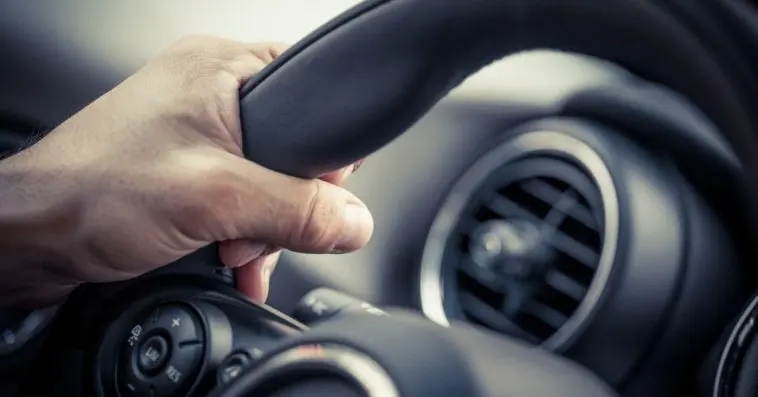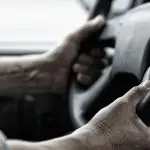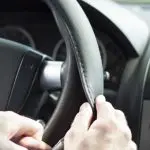When you notice that your car makes some weird noise when you turn the steering wheel when the vehicle is stationary, then there might be an issue with it.
This usually indicates that there is something deeper that is wrong with the vehicle.
As such, you should take the vehicle to be checked by a mechanic so that the necessary repairs are made before things get any more serious.
When turning the steering wheel, there are many components of the vehicle that would be affected. This is what causes the differences in the type of sound being produced.
Here’s the 9 causes of noises when you turn the steering wheel when the vehicle is stationary include:
- The Jounce Bushing Problems
- A Power Steering Rack that Is In Bad Condition
- Struts And The Shocks Are Worn Out
- Clogging Of The Steering Reservoir Tank
- Leaking Of The Power Steering Fluid
- Suspension Bushings Are Damaged
- Ball Joints Are Damaged
- Tie Rod Ends Are Worn Out
- Steering Column Bearing
You should be keen on the type of noise that is made by the vehicle. This is because it will be much easier to understand the cause of the noise when the type of noise is identified.
You should be specific when explaining the type of noise the steering wheel makes when the car is stationary; it can either be a whining sound, clunking, crunching, or even a squealing sound.
TABLE OF CONTENTS
6 Different Types Of Noise Occur When The Steering Wheel Is Turned On A Stationary Vehicle
You may have noticed that there are some abnormal noses being produced while you try to turn the steering wheel of your vehicle, which is stationary.
This happens as you have to apply a lot of force for the steering wheel to even turn.
You can get to know the different types of noises that you might hear when you turn the steering wheel of a stationary vehicle in this article, they include:
1. Whining Noise
- When you are able to hear your whining noise when turning your steering wheel, there are a number of complications that might be underlying.
One of the reasons for the whining noise is that the power steering fluid might have gone below a specific level.
You should know that the power steering fluid is required to lubricate the power steering system.
If the fluid runs out, then there will be friction, which then leads to the whining noise when turning the steering wheel. - The noise gets louder with time until the fluid is topped up. If you can, you should also check the condition of the fluid in place; it should be clean.
If it either has debris or any dirt particles, then it will not be able to do its work well. - The power steering pump might also be faulty, thus causing the whining noise. You should be able to notice this when you notice that the sound does not stop even as you try to add more fluid to the system.
The steering component may also produce a squeaking sound and not the whining sound. You should try checking either the seals of the vehicle, the ball joints, the universal joints, or the tie rod.
They will need a little bit of lubrication to verify the current situation and stop the noise being produced.
2. Creaking Noise
- If you are keen enough, you might be able to notice that your vehicle produces creaking noise when turning the steering wheel.
This is usually caused when the suspension of the vehicle is not as it is supposed to be. This makes them unable to support the weight of the vehicle in an appropriate way. - Creaking noise when turning the steering wheel will be produced if the struts or the shocks are not in the best of conditions. They may be worn out or simply dried due to the leaking of the shocks.
- The creaking sound might be arising from the jounce bushing, which night gets dried up.
The Jounce bushing is usually located at the front part of the struts and does not have to be dry. - The tie rods might get damaged, and this might cause the creaking noise. They are responsible for connecting the steering system and the wheels of the vehicle. Therefore, they affect the smooth transition of force from the steering wheel to the wheels; that means they may make the creaking noise when something is faulty.
- The ball joints might be responsible for the noise you are hearing when turning the steering wheel. They are what make the steering knuckles to be able to regulate the motion of the vehicle.
They also need to be lubricated to avoid noises due to unnecessary friction; if they run dry, they will produce the creaking noise when turning the steering wheel of the vehicle.
3. Grinding Noise
- Another type of noise that will indicate that something is wrong with your vehicle is the grinding noise when turning your steering wheel.
One major cause of this is that the fluid of the power steering wheel is running out, and this leads to a much low power when using the power steering wheel. - You should also be worried about the power steering belt, which might be affected by wearing out. It might also just be loose.
- Complications with the wheel bearing might also cause the grinding noise. It might be damaged due to wear and tear subjected to it while it is working.
The bearings located inside the steering column might be too worn out to work. The tie rod might also be too damaged to work well. - The grinding noise might also be brought about by the CV joint or the brake motors getting worn out.
How To Check The Condition Of Your Vehicle’s CV Joint
If the CV joint of your vehicle is damaged, then you will be able to hear a clicking sound when the steering wheel is turned.
This is especially if you are going around a sharp corner. As such, you will have to take the vehicle to a mechanic so that the necessary repairs or replacements are done.
One reason why you should be alarmed with the noise produced when the CV joints of your vehicle are to avoid dealing with greater damage than it is at the present time.
This is because the noise is usually a warning sound, and if it persists without you intervening, then more damage would be caused to the CV joint.
You will have to pay more for the repairs when you realize this too late.
You should be able to hear a clicking sound when you work the steering wheel. This will be prominent from the simple turns.
If things get worse, you will be able to hear the sounds even before you make that turn.
Early intervention is recommended to avoid the damage being passed on to other parts of the suspension system.
4. Clunking Noise
- At times you might turn the steering wheel and notice there is a noise that appears as “clunking sound.”
The clunking sound when turning the steering wheel might be brought about by sway bars that are destroyed.
The sway bars are responsible for the tires of the vehicle staying on the road at all times under any condition.
This is even as you make a quick or sharp turn. Faulty sway bars will cause the clunking noise when turning your steering wheel. - Another possible source of the clunking sound might be the broken suspension bushings. This is usually as a result of the metal clunking on each other as the steering wheel turns sideways.
You should be able to realize this sound, even more when it gets louder, especially if you go over a bumpy road.
5. Rubbing Noise
You should be worried when the steering wheel makes rubbing noise when turning as this usually has a deeper meaning.
It may indicate that the vehicle is damaged, especially on the components connected to the steering wheel. This would be an indicator of an alarm as it may end up causing more damage.
- The rubbing noise, to be specific, is caused when the Jounce bushing of your vehicle is not well lubricated.
Hence the vehicle will produce that rubbing noise when turning your steering wheel. You should have them lubricated as soon as you can to avoid more damage to other parts of the vehicle. - The steering column might get worn out after being in use for long and might be what is causing the rubbing noise.
The noise when you turn the steering wheel of the vehicle is more prominent, especially when the components expand during hot temperatures.
The upper bearing of the steering column might be what is causing the rubbing noise you hear.
6. Popping Noise
This is usually heard when you are on the road and driving at a relatively low speed.
This is usually a cause for alarm, just like any of the above situations. You should get the vehicle to a mechanic as soon as possible to avoid damaging the vehicle.
The noise produced usually arises from the fact that some parts of the steering wheel systems are damaged and will need the attention of an expert.
A popping noise when you turn your steering wheel will be caused by either of the following:
- Loosening of the hubcaps of the steering system.
- If all of your tires are not of the same pressure.
- Breaking of the constant velocity joint of the vehicle.
What Causes Noise When You Turn Your Vehicle’s Steering Wheel?
You should not be relaxed when you hear noises when your vehicle makes noises when you make a turn while driving.
This is because the noise is usually an indicator of something wrong with the internal components of the vehicle.
Generally, the noises would be an indicator showing that either of the following has been damaged:
1. The Jounce Bushing Problem
The jounce bushing is a part that is found in the front strut, and it is at the top part of the strut. When it has been used for long, it goes dry, and thus, when the vehicle turns, the noise will be produced.
The noise produced in this case is either a creaking or a groaning sound.
This type of damage will need your immediate action since if they persist, more harm will be caused, and you will have to deal with a bigger problem altogether.
2. A Power Steering Rack That Is In Bad Condition
If you notice that the vehicle is making a whining sound, then the issue might be that the power steering rack is in poor condition.
You will notice this when you are on the road, and the driving is at a relatively low speed. You should also be concerned with the condition of the belt or the vane pump as they too might be damaged.
3. Struts And The Shocks Are Worn Out
These are components of the vehicle that get worn out after a very long time, only if you are a good driver.
However, if you drive roughly or go over bumps at high speed, they will be damaged at a speedy rate.
After their expected lifespan, they might also get damaged, and this will be noticed with the noise the vehicle produces when you make a turn.
4. Clogging Of The Steering Reservoir Tank
In the reservoir tanks, there is power steering fluid which is stored in there. This needs to be kept clean, and a filter helps to ensure this.
However, it might get clogged and unable to do its work appropriately. This leads to the noise being produced while the vehicle is making a turn.
5. Leaking Of The Power Steering Fluid
Although not a major cause of worry, the power steering fluid should not be taken for granted. Just like the leaking of engine oil, you should attend to it and verify that everything is back to normal.
The power steering fluid is especially included in the vehicle to lubricate the power steering systems and help for the smooth working of the steering wheel.
When it leaks, the movement is rough and hence the noise that you hear when you are making a turn.
6. Suspension Bushings Are Damaged
The issue that might be causing your vehicle to make noises when you are going through a turn might be caused by driving in a vehicle with suspension bushings that are in poor condition.
These get worn out with time and will need replacing. If you ignore getting them replaced, they will break down and crack and hence will be unable to work as needed.
You will be able to hear a creaking sound as you turn the steering wheel from side to side.
7. Ball Joints Are Damaged
The ball joints are components that are included in the system of the vehicle and aid the smooth movement of the steering knuckles and the control arms.
If they run dry, they will produce the sound that you hear as noise.
You will need to have them lubricated after some time not only to prevent the noise but also to prevent the damage of other parts of the vehicle.
8. Tie Rod Ends Are Worn Out
The tie rod ends are included in the system of the vehicle as they are important in making the wheel turn respondent to turning off the steering wheel.
They may get simply worn out and will need replacement. Otherwise, they may get damaged due to reckless driving, and you will be able to hear a knocking sound as a result of this.
You should be able to hear the “knocks” even when you make a turn while driving at a slow speed. They will produce a knocking sound when turning the steering wheel.
9. Steering Column Bearing
If you notice the sound coming from the turning of your steering wheel appears as rubbing sound, then the issue might be either the upper bearing that is located on the steering wheel you are turning.
This leads to the plastic that is usually on the rear end of the steering wheels to be rubbed against the cowling on the steering column.
This creates the noise which appears most prominent when it gets hot, and the parts associated with this system are seen to expand.
How To Fix A Noisy Steering Wheel When Turning
For the fixing of noise coming out when you turn your steering wheel when turning, you should be ready to repair any component of the vehicle.
This is because, as discussed above, the steering wheel will make the noises based on a number of complications arising from different parts of the vehicle.
This procedure helps to fix the noise produced when the steering wheel is turned if what is causing it is that the power steering fluid is depreciated:
- Check the power steering fluid; the noise might because it has run dry or it has leaked and is below a specific level.
- If it is low, check for leaks in all of the parts, top to bottom. You should get all the exact points where the leak is coming from to avoid any leaks in the future.
- If the parts are oily, then the chances are that they are covered with the power steering fluid.
- Get a wrench and take out the old switch without damaging any of the components.
- Place a new switch in position, fixing it up with a wrench from the bottom. It should be able to stop the leaking effectively.
- Refill the power steering fluid with the best brand you can get.
More details, you can also watch this video:
Conclusion
A mechanic would be needed to identify the cause of the noise, and they might even need to take the vehicle for a test drive.
They can check the condition of the basic parts, which include the suspension system or even the power steering system.
They would then give a diagnosis and offer the best possible ways for the fixing; you might even have to get a component replaced.
In some instances, all that is needed is to lubricate the parts as they may just have gotten dry, and the noise is arising from the rough friction.
You can do this yourself with a power steering lubricant that should be able to control the noise.
Sources:
1. AutoVfix.com – https://autovfix.com/noise-when-turning-steering-wheel-while-stationary/
2. BuleDevil Products – https://gobdp.com/blog/why-is-their-noise-when-turning-my-steering-wheel/




